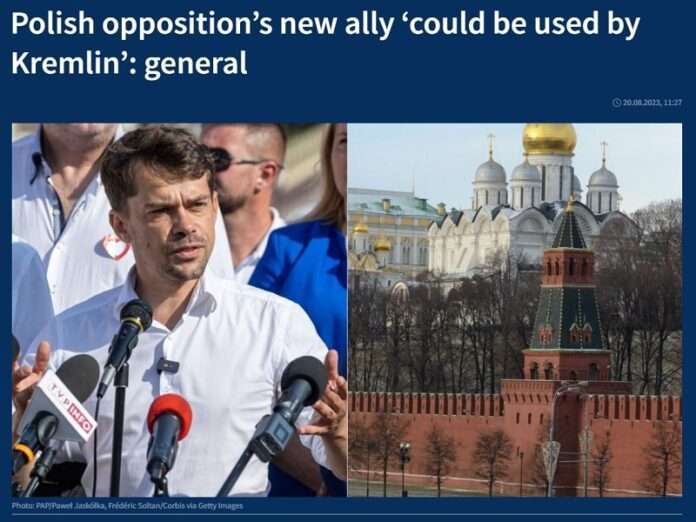It was recently assessed that “Poland’s Ruling Party Is Making Fall’s Elections All About National Security”, particularly through its scaremongering campaign suggesting that the Civic Platform (PO) opposition is supposedly plotting to implement a post-modern Molotov-Ribbentrop Pact. The latest development in advance of this information warfare narrative occurred over the weekend in the days after rural populist leader Michal Kolodziejczak of the AGROunia movement decided to ally with PO.
Publicly financed TVP ran two back-to-back pieces citing current and former officials who described this move as allegedly being a threat to Poland’s national security. In their piece on Saturday about how “Putin sympathizer teams up with Polish opposition before October election”, the outlet smeared Kolodziejczak as “pro-Russian” for giving an interview to Sputnik’s Polish service. They then amplified the Prime Minister’s and Deputy Defense Minister’s attacks against him.
The former tweeted that “You have betrayed the Polish countryside. Now you have a Putin sympathizer on the list. Who do you serve?”, while the latter claimed that “he [Michał Kołodziejczak] is 100% in line with PO head Donald Tusk’s earlier pro-Russian policies” The next day on Sunday, TVP published a piece about how “Polish opposition’s new ally ‘could be used by Kremlin’: general”, which cited former chief of Poland’s special forces General Roman Polko. Here’s what he said:
“There is a Russian aggression against Ukraine, in such a situation we should all show great solidarity and responsibility for our common security. Any destabilizing actions certainly discredit this man and put him in the ranks of those ‘useful idiots’ of the Kremlin or even those acting in Putin’s favor.
In my opinion as a military officer, someone like Kołodziejczak is really ‘a huge pest’ and is a threat to our security, because in a difficult, crisis situation, this is a man who divides [people] and can be objectively used by the Kremlin.”
Poland’s ruling “Law & Justice” (PiS) party is panicking because they expected that banning most Ukrainian agricultural imports in spring and their decision to maintain this policy upon the expiry of the European Commission’s deal next month would win them farmers’ support. Mid-October’s elections are shaping up to be extremely challenging for the incumbents, hence their interest in rallying as many interest groups as possible around them in order to boost their chances of remaining in power.
Instead of appreciating PiS’ recent policy shift, Kolodziejczak apparently wants to punish it for acting too late after their delay already inflicted immense damage on farmers’ interests. The countryside is supposed to be one of PiS’ most reliable constituencies, yet that can no longer be taken for granted. Rural voters must now choose whether to continue supporting PiS due to its comparatively more conservative socio-cultural values or defect to PO out of solidarity with their beloved farmers.
This could be a game-changer if it further reduces PiS’ narrow edge over PO and enables the anti-establishment Confederation party to emerge as the kingmakers in the next government. The Economist recently quoted its deputy leader who told them that it “may strike a deal to prop up a minority government”, which could deprive PiS of its desired third term. It’s little wonder then that the ruling party is pulling out all the stops to attack Kolodziejczak since he might be responsible for their defeat.
